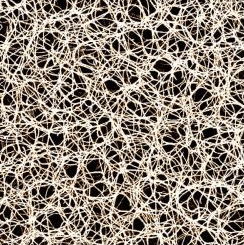U.S. Air Force researchers say they have developed analytical tools for biopolymers that could pave the way for the production of synthesized muscle tissue.
“Our results have provided some of the first microscopic insights into a sixty-year-old puzzle about the way polymeric networks react to repeated shear strains,” said Dr. Daniel Blair, assistant professor, and principal investigator of the Soft Matter Group in the Department of Physics at Georgetown University.
Blair, Professor Andreas Bausch and other researchers at Technische Universtaet Muenchen (Technical University of Munich) used a muscle filament known as actin to construct a polymer network in an effort to understand more about biopolymers.
They developed a rheometer and an instrument called a confocal microscope system that measures the mechanical properties of materials. These instruments can measure physical proprieties polymers that had been difficult to visualize during mechanical stress experiments. They captured visual images of the fluorescently labeled actin network. In fact, polymer filaments’ movements were filmed in 3D during application of mechanical stress.
“The rheometer and confocal microscopes will help to lay the groundwork for future generations of materials that will possibly be used to create synthesized muscle tissue for the Air Force,” according to a press release. “These materials may even be ideally suited for powering micro-robots.”
The instruments showed the shearing process (called the “Mullins Effect”) when biological polymers become dramatically softer. These materials also become stronger in a different way than conventional medical plastics. The researchers said they will use the Mullins Effect test as a way to understand the properties of composite and biological networks.
“We will use confocal-rheology as a benchmark system for generating new collaborations and expanding the technique to other AFOSR sponsored projects,” said Blair. “For example, in collaboration with Dr. Fritz Vollrath of the Oxford Silk Group and Dr. David Kaplan from Tufts University, we are investigating how shear stress influences the formation of silk fibers.”
The new testing protocol could also impact Air Force projects on the strengthening of nano-composite networks such as carbon nanotubes and cellulose nanofibers embedded in conventional materials. The Air Force Office of Scientific Research is based in Arlington, VA.








